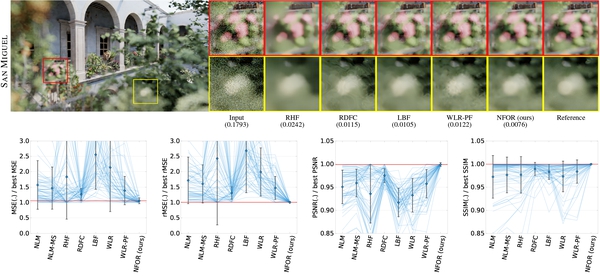Nonlinearly Weighted First-order Regression for Denoising Monte Carlo Renderings
We address the problem of denoising Monte Carlo renderings by studying existing approaches and proposing a new algorithm that yields state-of-the-art performance on a wide range of scenes.
June 22, 2016
Eurographics Symposium on Rendering (EGSR) 2016
Authors
Benedikt Bitterli (Disney Research)
Fabrice Rousselle (Disney Research)
Bochang Moon (Disney Research)
Jose A. Iglesias-Guitian (Disney Research)
David Adler (Walt Disney Animation Studios)
Kenny Mitchell (Disney Research/Edinburgh Napier University)
Wojciech Jarosz (Dartmouth College)
Jan Novak (Disney Research)
Nonlinearly Weighted First-order Regression for Denoising Monte Carlo Renderings
We analyze existing approaches from a theoretical and empirical point of view, relating the strengths and limitations of their corresponding components with an emphasis on production requirements. The observations of our analysis instruct the design of our new filter that offers high-quality results and stable performance. A key observation of our analysis is that using auxiliary buffers (normal, albedo, etc.) to compute the regression weights greatly improves the robustness of zero-order models, but can be detrimental to first-order models. Consequently, our filter performs a first-order regression leveraging a rich set of auxiliary buffers only when fitting the data, and, unlike recent works, considers the pixel color alone when computing the regression weights. We further improve the quality of our output by using a collaborative denoising scheme. Lastly, we introduce a general mean squared error estimator, which can handle the collaborative nature of our filter and its nonlinear weights, to automatically set the bandwidth of our regression kernel.

